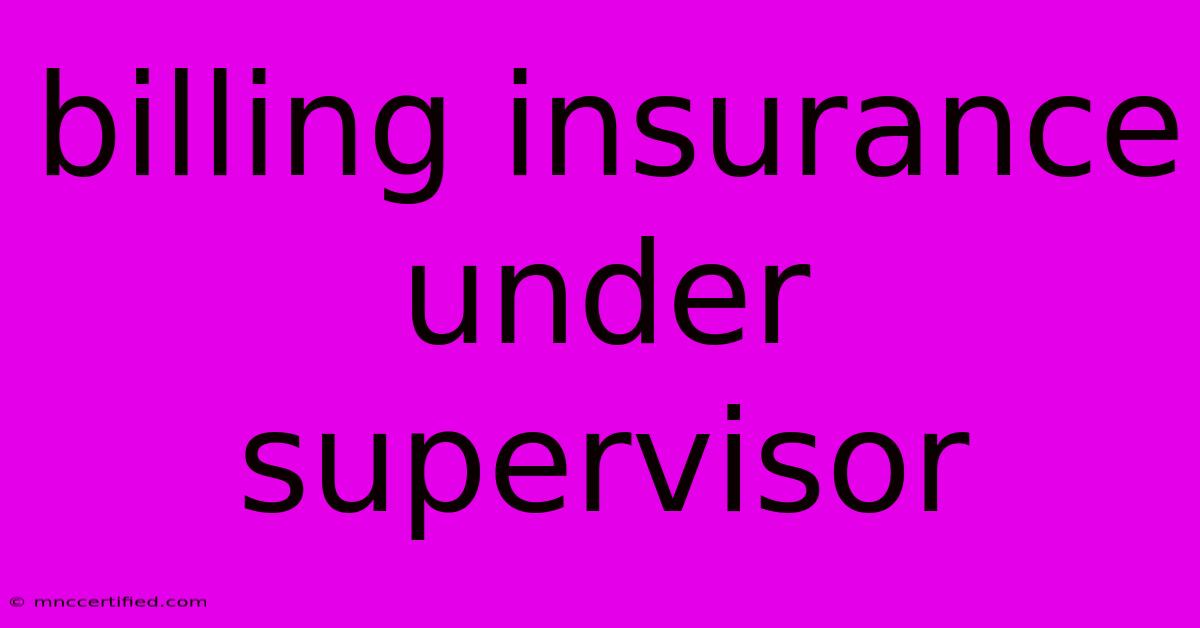Billing Insurance Under Supervisor

Table of Contents
Billing Insurance Under a Supervisor: A Comprehensive Guide
Billing insurance under a supervisor requires a blend of technical skill, meticulous attention to detail, and a strong understanding of healthcare regulations. This guide will equip you with the knowledge and strategies to excel in this crucial role.
Understanding the Supervisor's Role
Your supervisor acts as a mentor, guide, and quality control checkpoint. They're responsible for:
- Training and Onboarding: Providing you with the necessary knowledge of billing procedures, insurance regulations, and the practice's specific protocols.
- Oversight and Review: Regularly reviewing your work to identify errors, ensure accuracy, and maintain compliance.
- Problem Solving: Assisting with complex billing issues, denials, and appeals.
- Compliance and Regulatory Updates: Keeping you informed about changes in insurance guidelines and healthcare regulations.
Effective communication with your supervisor is paramount. Don't hesitate to ask questions, seek clarification, or report any challenges you encounter. A strong working relationship will ensure smooth workflows and minimize errors.
Essential Skills for Successful Insurance Billing
Mastering these skills will set you up for success:
- Medical Terminology and Coding: A solid understanding of medical terminology, ICD (International Classification of Diseases) codes, and CPT (Current Procedural Terminology) codes is essential for accurate billing. Continuous learning and staying updated on coding changes are vital.
- Insurance Plan Knowledge: Familiarity with various insurance plans, their coverage policies, and reimbursement rates is crucial. This includes understanding different types of insurance, such as Medicare, Medicaid, and private insurance plans.
- Claim Submission Procedures: Knowing the steps involved in submitting clean claims electronically or by mail, including accurate data entry and proper documentation.
- Denial Management: Understanding the reasons for claim denials, identifying errors, and taking corrective action to resubmit claims successfully. This includes appealing denied claims when necessary.
- Compliance with Regulations: Adhering to HIPAA (Health Insurance Portability and Accountability Act) regulations and other relevant healthcare laws and guidelines is crucial.
Mastering the Billing Process: A Step-by-Step Guide
- Patient Verification: Confirming patient insurance coverage, eligibility, and demographic information before providing services.
- Chart Review: Thoroughly reviewing medical charts to ensure accurate coding and documentation.
- Claim Preparation: Accurately entering all necessary information into the billing system, including patient details, procedure codes, and diagnoses.
- Claim Submission: Submitting claims electronically or by mail to the appropriate insurance payers.
- Follow-up on Claims: Monitoring the status of submitted claims and addressing any issues promptly.
- Accounts Receivable Management: Managing outstanding balances and pursuing payment for denied or unpaid claims.
Working Effectively with Your Supervisor
- Regular Check-ins: Schedule regular meetings to discuss progress, challenges, and upcoming tasks.
- Proactive Communication: Don't wait until a problem becomes critical before seeking help. Communicate any issues promptly.
- Documentation: Maintain thorough records of all billing activities and communications with your supervisor.
- Continuous Learning: Stay updated on changes in billing procedures and insurance regulations.
Advanced Strategies for Success
- Utilize Billing Software: Master the billing software used in your practice. Learn its features and shortcuts to increase efficiency.
- Develop Strong Time Management Skills: Prioritize tasks, manage your workload effectively, and meet deadlines consistently.
- Network with Colleagues: Engage with other billing professionals to learn best practices and share experiences.
By mastering these skills, maintaining open communication with your supervisor, and embracing continuous learning, you can significantly improve your insurance billing performance and contribute to the financial success of your medical practice. Remember, precision and attention to detail are paramount in medical billing, and your supervisor is your most valuable resource in achieving excellence.

Thank you for visiting our website wich cover about Billing Insurance Under Supervisor. We hope the information provided has been useful to you. Feel free to contact us if you have any questions or need further assistance. See you next time and dont miss to bookmark.
Featured Posts
-
Confirmed Chelsea Women Vs Man City
Nov 17, 2024
-
Rehab Loan For Investment Property
Nov 17, 2024
-
Rugby England Vs South Africa Live Score
Nov 17, 2024
-
Why Did My Renters Insurance Go Up
Nov 17, 2024
-
Driving Without Insurance Oklahoma
Nov 17, 2024